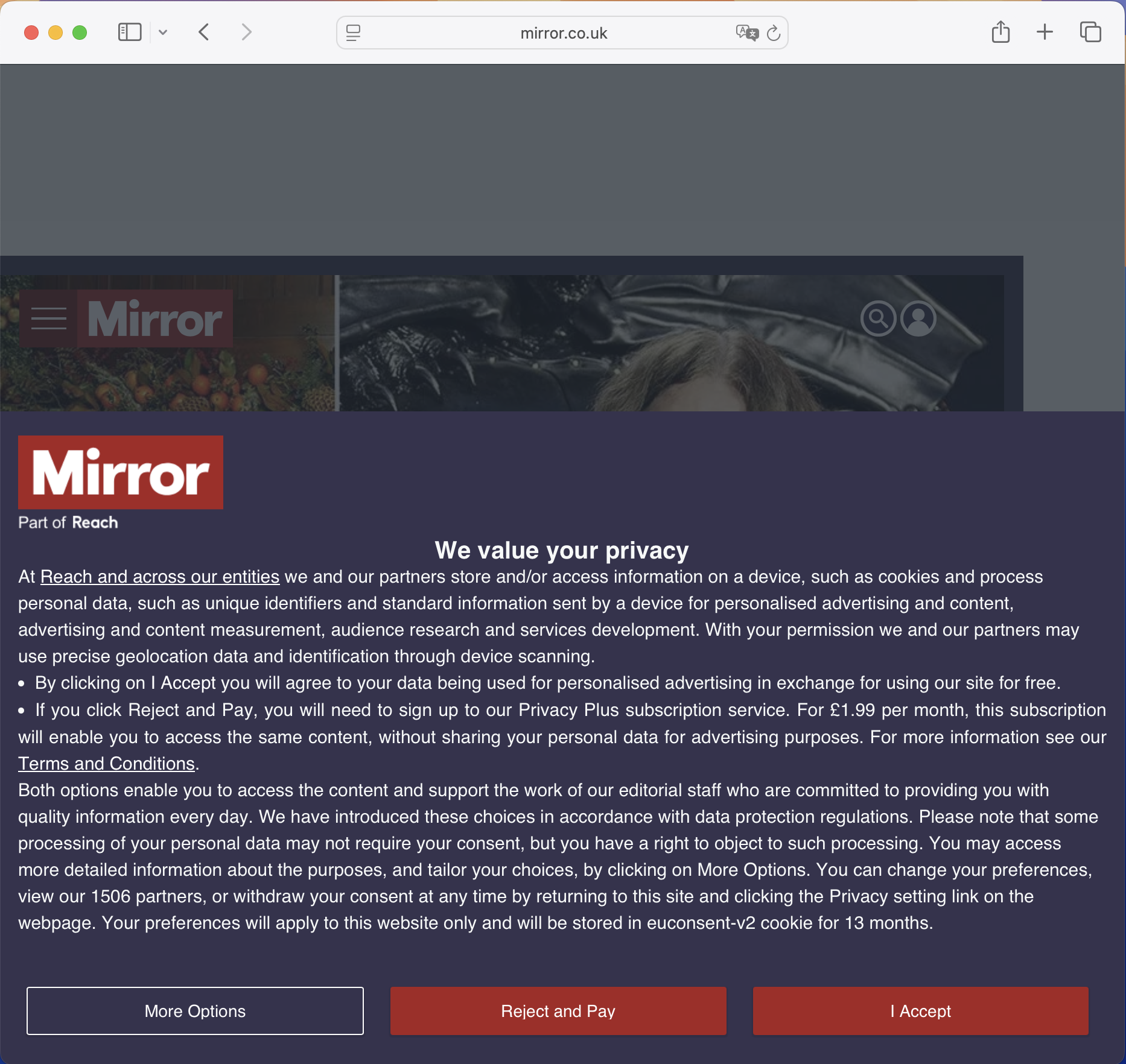The General Data Protection Regulation (GDPR) sets strict standards for how websites handle user data, particularly through cookies. A recent case involving The Mirror (mirror.co.uk) highlights the risks: their cookie banner forces users to either accept all cookies or pay a fee to reject non-essential cookies. This practice violates GDPR’s requirement for freely given consent, as it penalizes users for opting out. Such non-compliance can lead to regulatory scrutiny, fines, and reputational damage. This blog outlines how enterprises can set up compliant cookie policies and leverage tools like Kaamel’s Risk Management solution to prevent similar violations.
The Mirror’s GDPR Violation: A Case Study
The Mirror (https://www.mirror.co.uk) has implemented a cookie consent mechanism that violates GDPR principles. Specifically, their cookie banner requires users to either accept all cookies, including non-essential tracking and marketing cookies, or pay a subscription fee of £1.99 per month to reject them. This paywall approach undermines GDPR’s requirement that consent must be freely given, as it imposes a financial penalty on users who wish to protect their privacy. Such practices can trigger user complaints, regulatory investigations, and significant fines, as well as damage trust with audiences.

Understanding GDPR Cookie Requirements
GDPR, alongside the ePrivacy Directive, governs cookie usage in the EU. Cookies that collect personal data—such as tracking or marketing cookies—require explicit, informed, and freely given user consent. Key requirements include:
- Clear Information: Users must be informed about the types of cookies used, their purposes, and any third-party data sharing.
- Explicit Consent: Consent must be opt-in, with no pre-ticked boxes or implied consent through actions like scrolling.
- Easy Withdrawal: Users should be able to withdraw consent as easily as they give it.
- Separate Cookie Policy: A detailed cookie policy, distinct from the privacy policy, is recommended for transparency.
Violations, like The Mirror’s practice of charging users to reject cookies, contravene GDPR’s principles. Such practices risk fines up to €20 million or 4% of global annual turnover.
Common Pitfalls in Cookie Policies
Enterprises often face challenges in maintaining compliant cookie policies:
- Non-Compliant Banners: Banners that assume consent through inaction or charge for opt-outs, as seen with The Mirror, violate GDPR.
- Third-Party Cookies: Marketing cookies (e.g., Google Analytics, Facebook Pixel) often track users across sites, requiring explicit consent.
- Lack of Transparency: Failing to clearly disclose cookie purposes or third-party access can trigger complaints.
- Scalability Issues: Manual compliance checks struggle to keep up with website updates, multiple jurisdictions, and languages.
These issues can lead to customer complaints, regulatory investigations, and costly disruptions, as small technical errors often escalate into major legal issues.
Steps to Set Up a GDPR-Compliant Cookie Policy
To avoid violations and ensure compliance, enterprises should follow these steps:
- Conduct a Cookie Audit:
- Use automated tools to scan websites and mobile apps for all cookies, including third-party trackers.
- Identify which cookies are essential (e.g., for website functionality) and which require consent (e.g., marketing or analytics).
- Implement a Compliant Cookie Banner:
- Design a banner that offers clear opt-in and opt-out options.
- Avoid pre-ticked boxes, designs that nudge users toward accepting cookies (e.g., dark patterns), or fees for rejecting cookies, as implemented by The Mirror.
- Ensure users can reject non-essential cookies without penalties.
- Create a Transparent Cookie Policy:
- Draft a separate, accessible cookie policy detailing each cookie’s purpose, duration, and third-party involvement.
- Make the policy available in all languages supported by your website.
- Update the policy regularly to reflect changes in cookie usage or regulations.
- Enable Easy Consent Management:
- Provide a user-friendly interface for managing cookie preferences.
- Allow users to withdraw consent easily, such as through a persistent settings link.
- Integrate Compliance into Development:
- Embed privacy checks into your development workflow to catch issues early.
- Use tools to translate legal requirements into technical specifications for developers.
- Monitor and Update Continuously:
- Regularly scan for new cookies or trackers introduced by website updates or third-party integrations.
- Stay informed about evolving privacy laws, as 70% of the global population will be covered by such regulations in 2025.
How Kaamel Can Help
Manual compliance efforts are often tedious, expensive, and unscalable, especially for enterprises operating across multiple regions. Kaamel’s Risk Management solution (available at kaamel.com/product/risk-management) offers an AI-driven approach to proactively manage GDPR compliance and prevent incidents like The Mirror’s violation:
- Automated Discovery: Kaamel’s Regulator Bot scans websites, mobile apps, and policies to identify violations like faulty consent mechanisms, paywalls for opt-outs, or rogue cookies, tailored to your industry and region.
- Developer-Friendly Tools: Translates complex legal requirements into actionable technical tasks, integrating with tools like Jira to streamline fixes.
- Scalability: Supports 15+ frameworks, 45+ languages, and thousands of web pages, ensuring global compliance.
- Expert Support: Provides access to privacy experts for complex issues like enforcement requests or incident response.
By integrating Kaamel into your workflow, you can avoid disruptions from customer complaints, regulatory fines, or lawsuits, ensuring a seamless privacy experience for your users.
Conclusion
GDPR violations, like those committed by The Mirror through their coercive £1.99-per-month cookie paywall, underscore the importance of robust cookie policies. Enterprises must prioritize transparent, user-friendly consent mechanisms and continuous monitoring to stay compliant. Tools like Kaamel’s Risk Management solution empower businesses to proactively address privacy risks, embedding compliance into development processes and avoiding costly errors. Protect your enterprise and build customer trust by making privacy a priority today.
For more information on Kaamel’s solutions, visit kaamel.com/product/risk-management.




